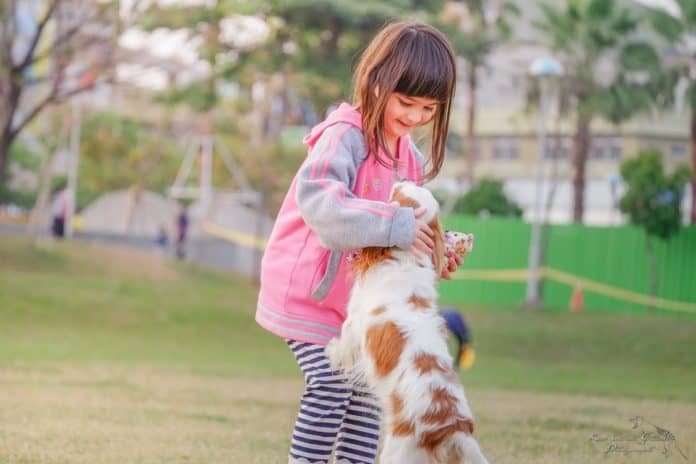Love from a dog is almost unbeatable. Not only do they offer us great companionship and loyalty, but studies show they go above that. Dogs have been shown to help with better mental health, blood pressure, and even lower stress levels.
Nowadays dogs are becoming more of a family member, rather than just a pet, and rightfully so. Dogs have been shown to positively affect children growing up by promoting responsibility, scheduling and habits that prepare them for the rest of their lives.
Here are some other ways dogs positively affect children growing up.
Constant Companionship & Emotional Growth
Just like human children, puppies need social contact; it’s nothing less than integral for their development. Puppies shouldn’t be separated from their litter or mother prior to 4 weeks (5-8 ideally); deprive a newborn pup from social contact during this vital stage of emotional and mental development and it will never fully recover.
Though humans can be said to be a bit more pliable in this respect, children need social contact just the same. Many psychologists with advanced degrees will argue the absolute vital nature of public schooling (as opposed to constant homeschooling and social sheltering) and interaction with peers their own age.
What better to offer a constant emotional support system then a puppy dog? A devoted dog to sleep in the child’s room at night, to see him off to school and be there patiently waiting when he arrives home?
Your child’s dog will be his absolute best friend, there to provide emotional support when he needs it and the devoted contact he needs to grow.
Some examples:
- Relax and reduce everyday stress
- Feel less lonely
- Something to care for
- More and better social interactions
A More Active Lifestyle
Wolves of old, the ancestors to modern day dogs, once needed to endure intensive and physically demanding pack hunting activities; their survival depended upon it. Because everything is readily provided for them, today’s domesticated dog does not.
Unfortunately, for this reason in general, it is estimated about 40% of American pet dogs are considered overweight or unhealthy. It’s essential to keep your dog at a healthy weight, and they need daily exercise to combat that fact and flourish!
Who better to offer those walks, those lively games of fetch or frisbee in the backyard than children? Not only would the activity benefit both parties physically, it provides an emotional bonding experience.
If nothing else, caring for a dog encourages daily walks and regular opportunities to play!
Some examples:
- Daily dog walks
- Outdoor chasing games
- Frisbee or ball fetch
- Agility training
Motor Skill Development
To properly develop fine motor skills, growing children need to exercise them, to work with their hands. From simple petting to holding a leash all the way up to more advanced (in comparison) training using hand signals, dogs are absolutely perfect for this!
Have you ever seen those impressive agility dog tricks performed on national television, in front of an audience of millions? Next time you watch, pay close attention to the handler directing the dogs- they are often running outside the course along with their dogs, directing them with hand signals.
This looks impossibly difficult, doesn’t it? Way too hard for a young child. Let me tell you a secret – a 4 year old could do it. Dogs are very good learners if properly motivated; they just need to be shown what is desired of them! Advanced dog training isn’t as much a question of the dog’s abilities, but the human’s ability to teach properly.
Now – think about a simple hurdle or hoop. Many trainers can achieve this with their dogs in all of 10 minutes. Once your child recognizes how to show his pet, you won’t believe the joy and laughter he will show in return.
Examples of motor skills improved during:
- Simple petting
- Running, chasing
- Tossing a ball
- Swimming (for selective breeds)
- Training
Cognitive & Mental Development
If learning the process of dog training along with parents doesn’t challenge a young child, helping boost their own mental development, what does? That aside, you’ve got communication, emotional growth (as stated above), responsibility and more.
Pets provide a vital support system for our kids. A child with a dog will never feel alone, having someone to come to when they are feeling down or depressed. In fact, studies show much lower rates of depression among pet owners.
Young children should not be held solely accountable for their dog’s care and physical needs. This should be a joint venture between parent and child.




